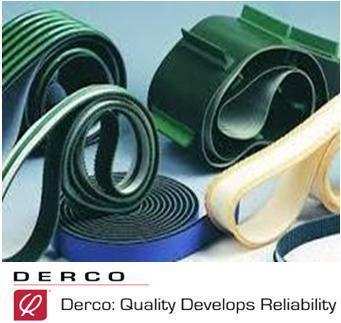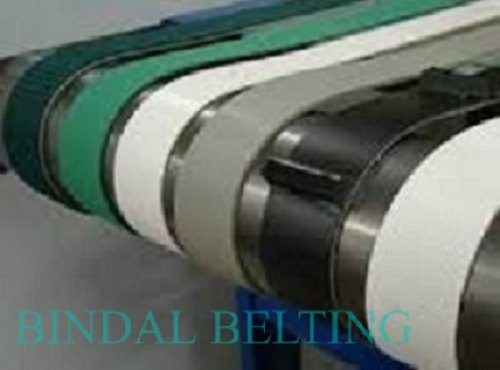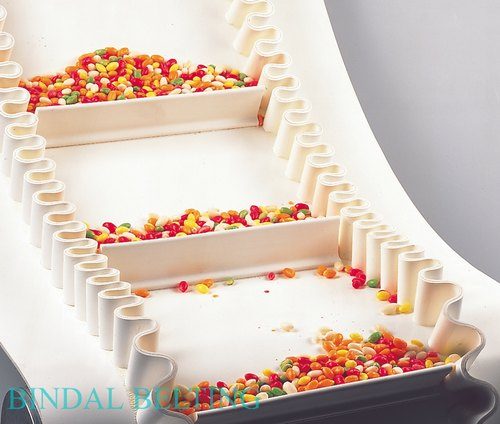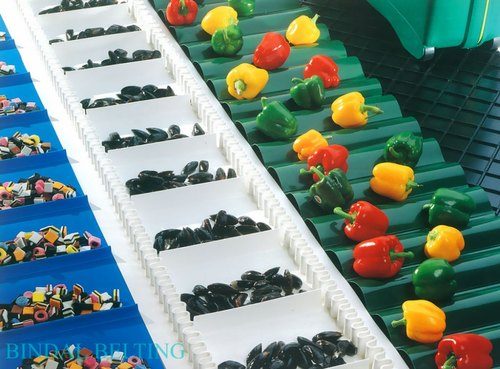



PVC Conveyor Belt
| Price per Unit | Meter |
| Material | PVC |
| Belt Width | UPTO 3000 mm |
| Belt Thickness | 2 – 5 mm |
| Tensile Strength | HIGH |
| Features | Chemical Resistant |
| Application Area | CONVEYING – FOOD, FMCG, PHARMA, CARTONS, TOBACCO, TYRE, PACKAGING ETC. |
| Length Of Belt | 500 mm to 10000 meter |
| Brand | DERCO, HOLLAND |
PVC Conveyor Belt
| Price per Unit | Meter |
| Material | PVC |
| Belt Width | UPTO 3000 mm |
| Belt Thickness | 2 – 5 mm |
| Tensile Strength | HIGH |
| Features | Chemical Resistant |
| Application Area | CONVEYING – FOOD, FMCG, PHARMA, CARTONS, TOBACCO, TYRE, PACKAGING ETC. |
| Length Of Belt | 500 mm to 10000 meter |
| Brand | DERCO, HOLLAND |
**Introduction to PVC Conveyor Belt:**
– PVC conveyor belts serve as versatile tools widely utilized in industries for material handling, offering an efficient means of transporting goods and materials across various stages of production and distribution processes. These belts, known for their durability, flexibility, and affordability, remain a popular choice in a wide range of applications.
**Construction and Design:**
– Manufacturers construct PVC conveyor belts with layers of PVC material, providing durability and flexibility. They typically use polyester or nylon fabric as the core of the belt, imparting strength and stability. PVC layers then cover the top and bottom surfaces, conferring resistance to abrasion, chemicals, and oils. The design of PVC conveyor belts may vary depending on specific application requirements, offering options for different load capacities, operating temperatures, and surface textures.
**Applications Across Industries:**
– PVC conveyor belts see widespread use across various industries due to their versatility and reliability. In manufacturing settings, they commonly transport raw materials, finished products, and parts in assembly lines. Logistics and distribution centers rely on PVC conveyor belts to move packages and parcels efficiently, facilitating sorting and distribution processes. Additionally, in food processing facilities, these belts ensure hygienic and safe transportation of food products on production lines. Furthermore, mining operations utilize PVC conveyor belts for transporting bulk materials such as coal, gravel, and minerals.
**Advantages and Benefits:**
– PVC conveyor belts offer several advantages over other types. They are highly durable and resistant to wear and tear, suitable for heavy-duty applications. PVC belts are flexible and easy to install, enabling quick and efficient conveyor system setup. They also exhibit good resistance to chemicals and oils, ensuring long-lasting performance in harsh environments. Moreover, PVC conveyor belts are cost-effective compared to other materials, making them an economical choice for many industries.
**Key Parameters for Design:**
– Designers consider several key parameters when designing PVC conveyor belts to ensure optimal performance. These include belt thickness, surface texture, and joining methods. Belt thickness is crucial for determining load-bearing capacity and durability. Surface texture varies based on the application, offering options for smooth, rough, or textured surfaces. Additionally, the method of joining belt ends, such as mechanical fasteners or heat welding, impacts the overall strength and longevity of the conveyor system.
**Conclusion:**
– PVC conveyor belts represent versatile and reliable solutions for material handling across various industries. Their durability, flexibility, and resistance to chemicals make them ideal for a wide range of applications. By carefully considering key design parameters, industries can ensure the optimal performance and longevity of PVC conveyor belts in their operations.

